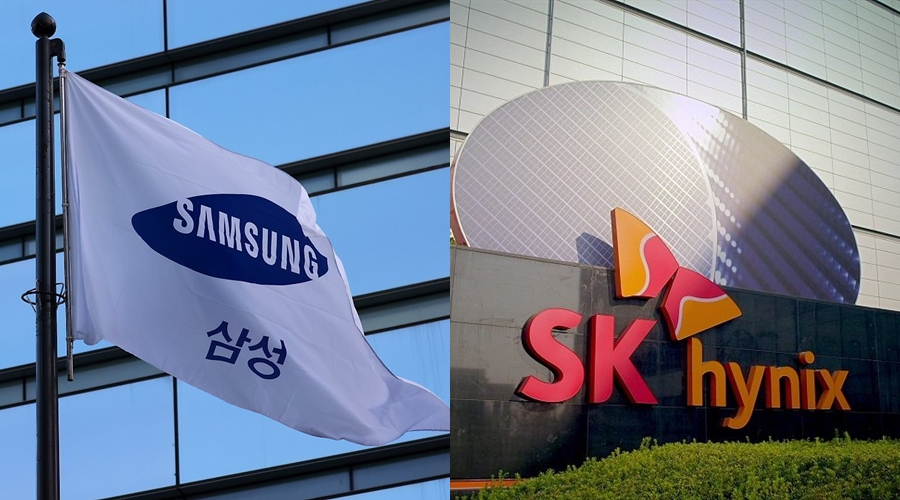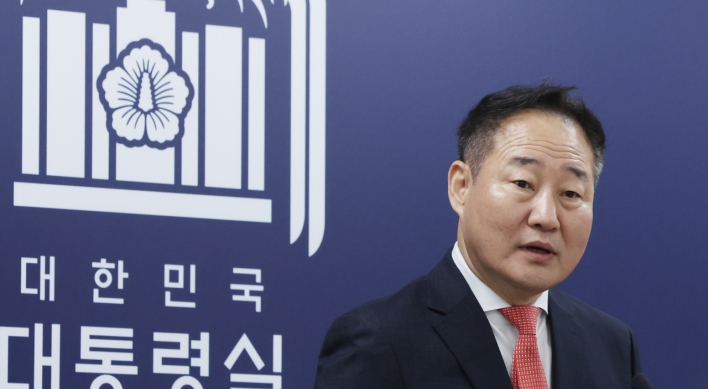Chip inventory hits 26-year high
Samsung, SK under greater pressure to join US-led chip value chain
By Jie Ye-eun
Published : March 5, 2023 - 17:24

South Korea's semiconductor inventory has increased to its highest point in 26 years, data showed Sunday, hammered by the sluggish demand for chips, the country's main export item, amid economic uncertainties.
According to data compiled by Statistics Korea, the inventory to sales ratio of chips produced by local chipmakers came in at 265.7 percent in January, the highest since 288.7 percent was posted in March 1997. Exports of chips also nosedived 42.5 percent on-year to $5.69 billion in February.
While Asia’s No. 4 economy is home to the world’s two largest memory chipmakers -- Samsung Electronics and SK hynix -- the two firms have seen their inventory surge around the same time.
According to industry sources, Samsung’s inventory assets reached an all-time high of 52.2 trillion won ($4.03 billion) as of the fourth quarter last year, up 26 percent compared to the same period in the previous year. SK’s inventory assets also jumped 75 percent on-year to some 15.6 trillion won during the cited period.
As a higher ratio usually indicates that companies are facing more hurdles in selling their products, the chipmakers will likely reduce production or lower prices further to maintain sales, resulting in falling chip prices, the sources said.
South Korea's semiconductor industry is under increasing pressure, beset with troubles both at home and abroad. With the higher inventory-to-sales ratio, global chip prices are likely to drop further and investment pressure from the US makes matters worse.
Samsung and SK are taking a cautious stance toward the US government’s latest announcement on the specifics of the CHIPS for America Funding Opportunity as it could endanger its global businesses, including their major operations in China.
Washington’s CHIPS for America Act is forcing Samsung and SK to pick between the US and China. However, it is difficult for an individual company to take a side amid the deepening US-China rivalry. If they choose not to apply for the program, it may signal to the US that the companies are not siding with the US-centered chip alliance but rather with China.
On Wednesday, the US government announced conditions for subsidies under the $53 billion act, designed to revitalize the American chip industry and secure supply chains. But they come with major strings attached, restricting recipients’ abilities to expand chip manufacturing capacities in other countries, including China for a decade and also requiring recipients to share a portion of any cash flow or returns that exceed the applicant's projections with the US government.
A couple of days after the Biden administration’s announcement on the subsidies program, US think tank Center for Strategic & International Studies released a report arguing that both Germany and South Korea need to join the new export controls agreement “to prevent the fracturing of the US-led global semiconductor value chain.”
"Korea is both a leader in chip manufacturing and a small but sophisticated producer of manufacturing equipment," the report stated.
"If the policy and diplomatic stars align, this could even mean that US and allied semiconductor equipment producers need not face an overall reduction in sales from the Oct. 7 regulations and their foreign equivalents -- merely a geographic customer realignment."
Last October, Washington announced a set of measures that restrict exports of advanced semiconductor manufacturing equipment to companies in China. Samsung and SK have received a one-year waiver from the US government after close consultation and discussion with Washington.
Meanwhile, some market experts said the US subsidies program can be considered a “poisoned chalice” for the world's two largest memory chipmakers, since they are heavily reliant on their Chinese facilities in manufacturing memory chips. About 40 percent of Samsung’s total NAND flash memory is being produced at its plant in Xi'an, China, while SK produces half of its total DRAM in Wuxi, China.
In the US, Samsung is building a $17 billion chip facility in Taylor, Texas, and SK is planning to select a chip packaging plant site there within the first half this year.
“Samsung Electronics and SK hynix have to consider whether they will keep their Chinese plants in operation and what could be their exit strategies,” Meritz Securities analyst Kim Sun-woo said. He also pointed out that they have to consider concerns over the possibility of disclosing confidential information and returning profits.
“Even if chipmakers make profits from their investments in the US, they will face questions about sharing most of their earnings with the US government," the analyst said.
"Samsung Electronics may use the subsidies to produce its DRAM chips there, but the tech giant will likely avoid producing highly profitable products.”
The Korean government is set to hold a meeting with Korean chipmakers Tuesday to discuss support measures ahead of the US releasing detailed guidance on national security guardrails sometime this month.






![[K-pop’s dilemma] Time, profit pressures work against originality](http://res.heraldm.com/phpwas/restmb_idxmake.php?idx=644&simg=/content/image/2024/05/08/20240508050705_0.jpg&u=20240508171126)
![[K-pop’s dilemma] Can K-pop break free from ‘fandom’ model?](http://res.heraldm.com/phpwas/restmb_idxmake.php?idx=644&simg=/content/image/2024/05/09/20240509050541_0.jpg&u=20240509173751)











